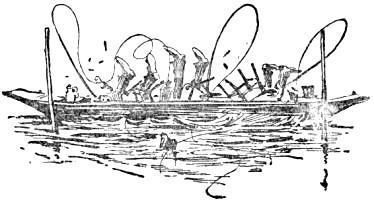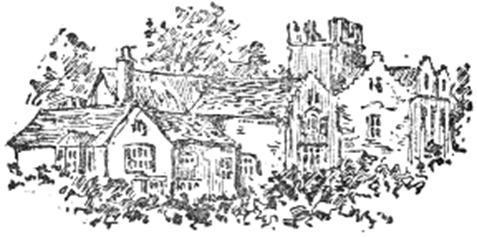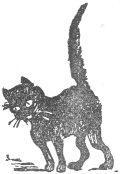Delphi Complete Works of Jerome K. Jerome (Illustrated) (Series Four) (21 page)
Read Delphi Complete Works of Jerome K. Jerome (Illustrated) (Series Four) Online
Authors: Jerome K. Jerome

George said he would steer, after that. He said a mind like mine ought not to be expected to give itself away in steering boats — better let a mere commonplace human being see after that boat, before we jolly well all got drowned; and he took the lines, and brought us up to Marlow.
And at Marlow we left the boat by the bridge, and went and put up for the night at the “Crown.”

CHAPTER XIII.
Marlow. — Bisham Abbey. — The Medmenham Monks. — Montmorency thinks he will murder an old Tom cat. — But eventually decides that he will let it live. — Shameful conduct of a fox terrier at the Civil Service Stores. — Our departure from Marlow. — An imposing procession. — The steam launch, useful receipts for annoying and hindering it. — We decline to drink the river. — A peaceful dog. — Strange disappearance of Harris and a pie.
Marlow is one of the pleasantest river centres I know of. It is a bustling, lively little town; not very picturesque on the whole, it is true, but there are many quaint nooks and corners to be found in it, nevertheless — standing arches in the shattered bridge of Time, over which our fancy travels back to the days when Marlow Manor owned Saxon Algar for its lord, ere conquering William seized it to give to Queen Matilda, ere it passed to the Earls of Warwick or to worldly-wise Lord Paget, the councillor of four successive sovereigns.
There is lovely country round about it, too, if, after boating, you are fond of a walk, while the river itself is at its best here. Down to Cookham, past the Quarry Woods and the meadows, is a lovely reach. Dear old Quarry Woods! with your narrow, climbing paths, and little winding glades, how scented to this hour you seem with memories of sunny summer days! How haunted are your shadowy vistas with the ghosts of laughing faces! how from your whispering leaves there softly fall the voices of long ago!

From Marlow up to Sonning is even fairer yet. Grand old Bisham Abbey, whose stone walls have rung to the shouts of the Knights Templars, and which, at one time, was the home of Anne of Cleves and at another of Queen Elizabeth, is passed on the right bank just half a mile above Marlow Bridge. Bisham Abbey is rich in melodramatic properties. It contains a tapestry bed-chamber, and a secret room hid high up in the thick walls. The ghost of the Lady Holy, who beat her little boy to death, still walks there at night, trying to wash its ghostly hands clean in a ghostly basin.
Warwick, the king-maker, rests there, careless now about such trivial things as earthly kings and earthly kingdoms; and Salisbury, who did good service at Poitiers. Just before you come to the abbey, and right on the river’s bank, is Bisham Church, and, perhaps, if any tombs are worth inspecting, they are the tombs and monuments in Bisham Church. It was while floating in his boat under the Bisham beeches that Shelley, who was then living at Marlow (you can see his house now, in West street), composed
The Revolt of Islam
.
By Hurley Weir, a little higher up, I have often thought that I could stay a month without having sufficient time to drink in all the beauty of the scene. The village of Hurley, five minutes’ walk from the lock, is as old a little spot as there is on the river, dating, as it does, to quote the quaint phraseology of those dim days, “from the times of King Sebert and King Offa.” Just past the weir (going up) is Danes’ Field, where the invading Danes once encamped, during their march to Gloucestershire; and a little further still, nestling by a sweet corner of the stream, is what is left of Medmenham Abbey.
The famous Medmenham monks, or “Hell Fire Club,” as they were commonly called, and of whom the notorious Wilkes was a member, were a fraternity whose motto was “Do as you please,” and that invitation still stands over the ruined doorway of the abbey. Many years before this bogus abbey, with its congregation of irreverent jesters, was founded, there stood upon this same spot a monastery of a sterner kind, whose monks were of a somewhat different type to the revellers that were to follow them, five hundred years afterwards.
The Cistercian monks, whose abbey stood there in the thirteenth century, wore no clothes but rough tunics and cowls, and ate no flesh, nor fish, nor eggs. They lay upon straw, and they rose at midnight to mass. They spent the day in labour, reading, and prayer; and over all their lives there fell a silence as of death, for no one spoke.
A grim fraternity, passing grim lives in that sweet spot, that God had made so bright! Strange that Nature’s voices all around them — the soft singing of the waters, the whisperings of the river grass, the music of the rushing wind — should not have taught them a truer meaning of life than this. They listened there, through the long days, in silence, waiting for a voice from heaven; and all day long and through the solemn night it spoke to them in myriad tones, and they heard it not.
From Medmenham to sweet Hambledon Lock the river is full of peaceful beauty, but, after it passes Greenlands, the rather uninteresting looking river residence of my newsagent — a quiet unassuming old gentleman, who may often be met with about these regions, during the summer months, sculling himself along in easy vigorous style, or chatting genially to some old lock-keeper, as he passes through — until well the other side of Henley, it is somewhat bare and dull.
We got up tolerably early on the Monday morning at Marlow, and went for a bathe before breakfast; and, coming back, Montmorency made an awful ass of himself. The only subject on which Montmorency and I have any serious difference of opinion is cats. I like cats; Montmorency does not.

When I meet a cat, I say, “Poor Pussy!” and stop down and tickle the side of its head; and the cat sticks up its tail in a rigid, cast-iron manner, arches its back, and wipes its nose up against my trousers; and all is gentleness and peace. When Montmorency meets a cat, the whole street knows about it; and there is enough bad language wasted in ten seconds to last an ordinarily respectable man all his life, with care.
I do not blame the dog (contenting myself, as a rule, with merely clouting his head or throwing stones at him), because I take it that it is his nature. Fox-terriers are born with about four times as much original sin in them as other dogs are, and it will take years and years of patient effort on the part of us Christians to bring about any appreciable reformation in the rowdiness of the fox-terrier nature.
I remember being in the lobby of the Haymarket Stores one day, and all round about me were dogs, waiting for the return of their owners, who were shopping inside. There were a mastiff, and one or two collies, and a St. Bernard, a few retrievers and Newfoundlands, a boar-hound, a French poodle, with plenty of hair round its head, but mangy about the middle; a bull-dog, a few Lowther Arcade sort of animals, about the size of rats, and a couple of Yorkshire tykes.
There they sat, patient, good, and thoughtful. A solemn peacefulness seemed to reign in that lobby. An air of calmness and resignation — of gentle sadness pervaded the room.
Then a sweet young lady entered, leading a meek-looking little fox-terrier, and left him, chained up there, between the bull-dog and the poodle. He sat and looked about him for a minute. Then he cast up his eyes to the ceiling, and seemed, judging from his expression, to be thinking of his mother. Then he yawned. Then he looked round at the other dogs, all silent, grave, and dignified.
He looked at the bull-dog, sleeping dreamlessly on his right. He looked at the poodle, erect and haughty, on his left. Then, without a word of warning, without the shadow of a provocation, he bit that poodle’s near fore-leg, and a yelp of agony rang through the quiet shades of that lobby.
The result of his first experiment seemed highly satisfactory to him, and he determined to go on and make things lively all round. He sprang over the poodle and vigorously attacked a collie, and the collie woke up, and immediately commenced a fierce and noisy contest with the poodle. Then Foxey came back to his own place, and caught the bull-dog by the ear, and tried to throw him away; and the bull-dog, a curiously impartial animal, went for everything he could reach, including the hall-porter, which gave that dear little terrier the opportunity to enjoy an uninterrupted fight of his own with an equally willing Yorkshire tyke.
Anyone who knows canine nature need hardly, be told that, by this time, all the other dogs in the place were fighting as if their hearths and homes depended on the fray. The big dogs fought each other indiscriminately; and the little dogs fought among themselves, and filled up their spare time by biting the legs of the big dogs.
The whole lobby was a perfect pandemonium, and the din was terrific. A crowd assembled outside in the Haymarket, and asked if it was a vestry meeting; or, if not, who was being murdered, and why? Men came with poles and ropes, and tried to separate the dogs, and the police were sent for.
And in the midst of the riot that sweet young lady returned, and snatched up that sweet little dog of hers (he had laid the tyke up for a month, and had on the expression, now, of a new-born lamb) into her arms, and kissed him, and asked him if he was killed, and what those great nasty brutes of dogs had been doing to him; and he nestled up against her, and gazed up into her face with a look that seemed to say: “Oh, I’m so glad you’ve come to take me away from this disgraceful scene!”
She said that the people at the Stores had no right to allow great savage things like those other dogs to be put with respectable people’s dogs, and that she had a great mind to summon somebody.
Such is the nature of fox-terriers; and, therefore, I do not blame Montmorency for his tendency to row with cats; but he wished he had not given way to it that morning.
We were, as I have said, returning from a dip, and half-way up the High Street a cat darted out from one of the houses in front of us, and began to trot across the road. Montmorency gave a cry of joy — the cry of a stern warrior who sees his enemy given over to his hands — the sort of cry Cromwell might have uttered when the Scots came down the hill — and flew after his prey.
His victim was a large black Tom. I never saw a larger cat, nor a more disreputable-looking cat. It had lost half its tail, one of its ears, and a fairly appreciable proportion of its nose. It was a long, sinewy-looking animal. It had a calm, contented air about it.
Montmorency went for that poor cat at the rate of twenty miles an hour; but the cat did not hurry up — did not seem to have grasped the idea that its life was in danger. It trotted quietly on until its would-be assassin was within a yard of it, and then it turned round and sat down in the middle of the road, and looked at Montmorency with a gentle, inquiring expression, that said:
“Yes! You want me?”
Montmorency does not lack pluck; but there was something about the look of that cat that might have chilled the heart of the boldest dog. He stopped abruptly, and looked back at Tom.
Neither spoke; but the conversation that one could imagine was clearly as follows: —
The Cat: “Can I do anything for you?”
Montmorency: “No — no, thanks.”
The Cat: “Don’t you mind speaking, if you really want anything, you know.”